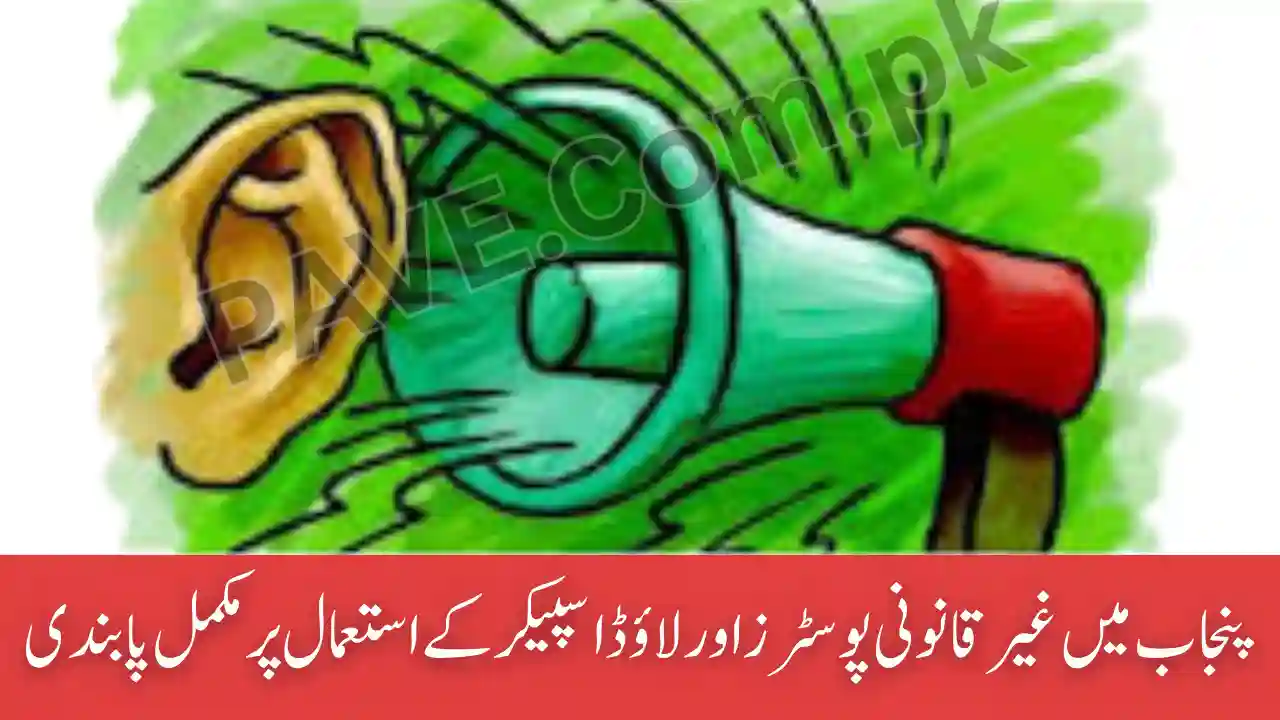Complete Ban Imposed on Posters and Loudspeaker Violations in Punjab

The Loudspeaker Act Punjab has taken a strong and historic step by imposing a complete ban on illegal posters and loudspeaker violations across the province. This decision comes after growing concerns about visual pollution, noise disturbance, hate speech, and misuse of sound systems in public places, religious institutions, and political gatherings. Authorities believe that unchecked banners, wall chalking, and loudspeaker misuse not only disturb peace but also create social tension and law-and-order issues.
In recent months, public complaints increased about loudspeakers being used late at night for religious sermons, political rallies, commercial promotions, and protest announcements. Similarly, posters and banners were seen hanging on electric poles, public buildings, traffic signals, and street walls, spoiling the beauty of cities and damaging government property. Many of these posters displayed hate-filled slogans or promotional messages without permission, which violated public decency laws.
To restore discipline, the government decided to impose strict restrictions. Under the new policy, no individual, organization, mosque, or political party is allowed to use loudspeakers beyond the permitted limit or without official approval. Similarly, wall chalking, banner hanging, and sticker pasting on public walls are completely prohibited unless authorized by local administration.
This ban aims to protect citizens from unnecessary noise, maintain public order, and keep cities clean and visually peaceful. Authorities have made it clear that any violation will result in heavy fines, FIRs, and even imprisonment, depending on the severity of the offense. Police, district officers, and intelligence agencies have been instructed to conduct surprise inspections and take immediate action against offenders without any discrimination.
The government has also urged mosque imams, political leaders, traders, and social organizations to cooperate. Instead of using loud sound systems or unlawful posters, people have been advised to use social media, SMS services, or legal print advertising platforms for announcements and promotions. Public awareness campaigns are being launched to educate people about the harms of noise pollution and illegal advertising.
This decision marks a turning point in Punjab’s public safety and environmental improvement strategy. If implemented properly, it will reduce noise pollution, discourage hate speech, protect public property, and promote a cleaner and more disciplined society.
Why Was the Ban Necessary?
- Noise pollution affects mental and physical health. Constant loudspeaker noise causes stress, irritability, headaches, heart issues, and sleep disruption.
- Illegal posters destroy public property and city beauty. Walls painted with random slogans or banners hanging everywhere leave a bad impression on visitors.
- Hate speech through sound systems increases communal tension. Misuse of loudspeakers during sermons or rallies often spreads negativity.
- Uncontrolled advertising leads to chaos. Businesses and political workers pasting posters on every wall makes the environment look unmanaged.
Read Also: Top 10 Electric Scooters in Pakistan 2025
What Exactly Is Banned?
| Activity | Status | Notes |
|---|---|---|
| Use of loudspeakers for speeches, rallies, announcements without permit | Banned | Only allowed for Azan and official announcements |
| Wall chalking, spray painting slogans | Completely banned | Illegal under defacement laws |
| Hanging posters on street poles, traffic signals, government buildings | Not allowed | Must seek permission from local authority |
| Promotional vans with high-volume sound systems | Prohibited | Can be seized by police |
| Political loud processions | Restricted | Only allowed with route permission |
Penalties for Violations 2025:
The Punjab government has made it clear that strict punishment will be given to lawbreakers. The penalties may include:
- Fine ranging from Rs. 5,000 to Rs. 50,000
- Seizure of loudspeaker equipment or promotional material
- FIR registration for repeated offenses
- Imprisonment up to 6 months in serious cases of hate speech
Special monitoring teams have been formed at district and tehsil levels to ensure these rules are implemented strictly.
Read Also: PM Electric Bike and Rikshaw Scheme Eligibility October 2025
How Will the Ban Be Enforced?
To ensure that the ban is not just an announcement but a practical reality, the government has deployed:
- Police teams for market inspections
- Union Council-level monitoring squads
- Cameras and drone surveillance in sensitive areas
- Direct reporting system for citizens to complain
Citizens have also been encouraged to report any illegal loudspeaker usage or poster installation through helpline numbers and mobile apps.
Role of Religious and Political Leaders 2025:
The administration has held meetings with:
- Religious scholars (Ulema)
- Mosque committees
- Political party representatives
- Business associations
They have been requested to follow the new code of conduct. Mosque loudspeakers are now only allowed for Azan and two official announcements, not for long sermons or public discussions. Political workers have been advised to use digital campaigns instead of wall chalking.
Read More: Electric Vehicles in Pakistan
Benefits of the Ban 2025:
- ✅ Better sleep and peaceful environment for citizens
- ✅ Reduction in unnecessary public gatherings
- ✅ Cleaner streets and improved city appearance
- ✅ Less spreading of hate or provocative content
- ✅ Improved law-and-order situation
FAQs Loudspeaker Act Punjab violations 2025:
1. Can mosques still use loudspeakers?
Yes, but only for Azan and officially permitted announcements.
2. Are election posters allowed?
Only after getting written permission from district administration.
3. Can I promote my business through banners?
Yes, but only through authorized advertising boards or legal billboards.
4. What happens if someone pastes a poster without permission?
Police can impose fines, file FIRs, and remove the posters immediately.
5. Is the ban temporary or permanent?
It is a permanent policy for public safety and discipline.
6. Can political parties hold rallies with sound systems?
Only if they take prior permission and follow sound limits.
7. Can individuals use loudspeakers for weddings?
Outdoor loudspeakers are not allowed without special approval.
8. Who should be contacted for permission?
The local Deputy Commissioner or Assistant Commissioner office.
9. Will there be public awareness campaigns?
Yes, the government is running media campaigns and mosque announcements.
10. Can citizens report violations?
Yes, through police helpline (15) or local complaint portals.
Conclusion:
The Loudspeaker Act Punjab violations is a highly Follow Whatsapp Channelstep toward cleaner cities, peaceful neighborhoods, and a responsible society. For too long, people misused sound systems and public walls without thinking about others. Now, with strict fines and enforcement, people will learn to respect rules and public comfort.
This ban is not meant to stop religious or political activities, but to ensure they are done in a disciplined and lawful manner. Noise control is not just a government duty—it is a moral duty of every citizen. When we avoid disturbing others, we build a healthier and more united community.










